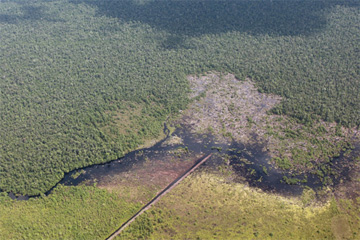Speaking at a high-level event on the sidelines of climate talks in Cancun, Mexico, financier and philanthropist George Soros made an impassioned call to protect Indonesia’s peatlands, the destruction and degradation of which are the largest source of carbon dioxide emissions across the Southeast Asian nation.
Soros told the forum—hosted by Avoided Deforestation Partners— he is ready to invest in rehabilitation of drained peatlands in Indonesia. He urged the private sector to do the same, noting that peatlands, and rainforests, represent a ripe opportunity slow climate change.
Soros said conserving forests and peatlands would require a major shift away from business-as-usual in Indonesia.
 George Soros at the Avoided Deforestation Partners event. Courtesy of AD Partners. |
“[Indonesian President] Yudhoyono has to overcome resistance from the business community, the bureaucracy, and communities that benefit from illegal logging,” he said. “It’s really a matter of public administration.”
Soros highlighted the “Mega Rice Project”, a scheme that deforested a million hectares of peat forest in Central Kalimantan on the island of Borneo, as an example of the kind of projects that can no longer be part of Indonesia’s development strategy. The project failed to produce any rice, but it did line the pockets of well-connected loggers.
Soros’ awareness of the importance of peatlands was apparently sparked by a recent trip to an area deforested for the rice project. Wetlands International, a group that works to protect wetlands worldwide, served as his guide.
Marcel Silvius of Wetlands International welcomed the financier’s remarks.
 Draining and clearing of peat forest in Central Kalimantan, Indonesia. Photo by Rhett A. Butler. |
“It is very encouraging that in addition to public funding now also major private sector players are showing their concern about the issue and are doing their bit to address these huge sources of emissions,” Silvius said in a statement. “In the absence of compliance markets private sector initiatives are needed to trigger voluntary market mechanisms that can provide a fair price for emission reductions and carbon sequestration. This can create a new business sector in which local communities can play an important role as custodians of the world’s peatlands, forests and biodiversity.”
Wetlands International estimates annual carbon dioxide emissions from peatland degradation in Indonesia at nearly a billion tons per year. Emissions result from drainage of peatlands and associated fires. Peatlands are often targeted for oil palm and wood-pulp plantations because the land is generally cheaper and less subject to competing land claims. Under the Indonesia-Norway agreement signed in May, Indonesia will implement a moratorium on the granting of new concessions on peatlands starting in January, although existing undeveloped peatlands concessions may still be converted for palm oil, timber, and paper pulp production.
Related articles







